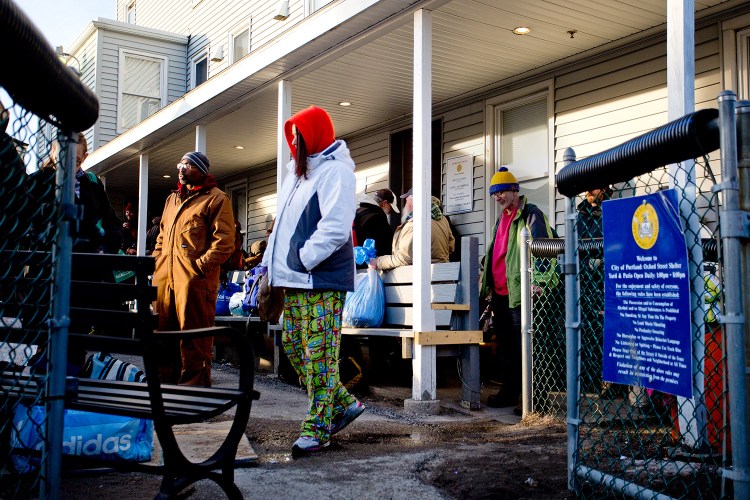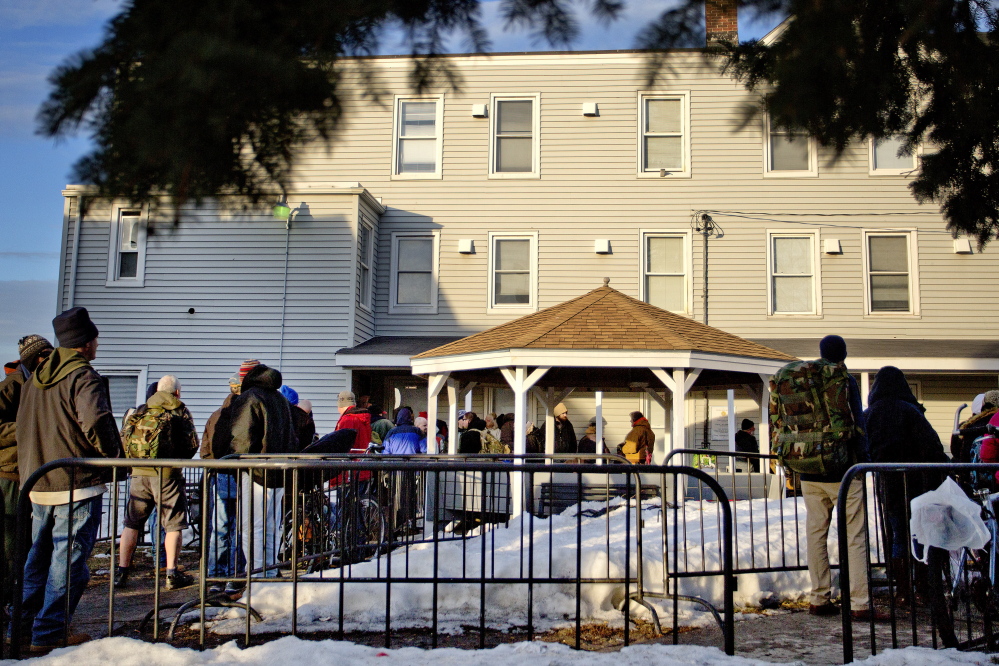AUGUSTA — Operators of homeless shelters from across Maine urged lawmakers Monday to support a bill that would provide $3.5 million in state funding to help relieve financial pressure and, in some cases, prevent further closings of emergency shelters.
Advocates noted that the state appropriates only $364,000 annually in direct funding for 42 shelters statewide, leaving the facilities to lean on a patchwork of funding and private donations to serve clients who are often suffering from mental illness or substance abuse or fleeing domestic violence. They said the proposed increase is the bare minimum needed to cover operating costs, and called for more substantive reforms to address a crisis created by cuts to MaineCare and by inadequate planning and resources.
For some shelters, including two city-run facilities in Portland, the funding patchwork includes General Assistance, the state program designed to help struggling individuals pay for basic necessities such as rent, food, medication, fuel and utilities.
The legislation, sponsored by Sen. Justin Alfond, D-Portland, was submitted before the LePage administration began pressuring Portland to stop using General Assistance funding to reimburse stays at the two city-run homeless shelters. However, Alfond hopes the debate over the state’s initiative will illuminate the challenges faced by shelters struggling to accommodate clients. He said the microscope on Portland has highlighted that “General Assistance was never intended to fund shelters on a daily basis,” but more importantly, that shelters are inadequately funded.
“No one chooses to be homeless,” he said. “Our shelters serve as the last line of defense for the neediest among us. The purpose of this bill is to provide a dedicated and stable funding source to ensure that our most vulnerable Mainers have a safe place to sleep at night.”
Annual point-in-time surveys conducted each January by the U.S. Department of Housing and Urban Development show that the overall homeless population in Maine was 2,726 people in 2014, a decline from 3,016 people in 2013 and roughly equal to the 2,769 people in 2005. Those figures include people in emergency shelters, transitional housing and outside, with no shelter at all.
The emergency shelter population increased by 50 percent in the past decade, climbing from 731 in 2005 to 839 in 2009 and to 1,102 in 2014, according to HUD. The agency also found that Maine has one of the lowest percentages in the nation of people with no shelter at all, at 3.4 percent.
The Maine State Housing Authority’s deputy director, Peter Merrill, testified in favor of Alfond’s bill Monday. No one spoke against the measure.
Gov. Paul LePage’s office did not respond to a request for comment on the bill.
MENTAL ILLNESS, SHELTER CROWDING
At Monday’s public hearing, shelter executives from across the state told lawmakers on the Labor, Commerce, Research and Economic Development Committee that the additional funding would be a lifeline.
“The state is good at many things,” said Dennis Marble, executive director of the Bangor Area Homeless Shelter. “Taking care of its mentally ill is not one of them.”
Marble told the story of a client who died last year. The woman suffered from delusions, including that she had a doctorate in microbiology and had access to family property on a midcoast island. The woman bounced among shelters in Bangor, Portland and Boston, all while eluding efforts to have her admitted to Dorothea Dix Psychiatric Center. Marble said it cost the shelter $300,000 – nearly 80 percent of the funding that the state distributes to all 42 shelters – to care for and shelter the woman.
“Her story is one of thousands that describe how Maine’s emergency shelters are serving those with mental illness that the Department of Health and Human Services is unable or unwilling to,” Marble said.
Mark Swann, executive director of Preble Street in Portland, said that on any given night the state’s 42 shelters are housing roughly 1,000 Mainers.
“We desperately need your help,” Swann told lawmakers Monday. “We’re turning people away each night. Shelter directors, I can tell you, we all hold our breath knowing how dangerously understaffed we are at times. The fragility of our shelter system cannot be overstated.”
PORTLAND ALREADY LOSING FUNDING
According to a budget report by the state housing authority, a quasi-public agency, emergency homeless shelters received $500,000 in state funding beginning in 1988. Budget cuts have steadily reduced the subsidy to $364,000 last year. The housing authority also provides $2.8 million to the shelters through what’s called the House Opportunities for Maine Fund, or HOME. However, that fund was originally created by the Legislature in 1983 to provide long-term affordable housing, not emergency shelters.
The funding source for HOME is derived from a share of the real estate transfer tax collected on home sales. Ten percent of the transfer tax goes to the counties, and the rest is divided between the state’s General Fund and HOME. Lawmakers doubled the transfer tax in 1983 to provide a reliable funding source for affordable housing.
The funding struggle is particularly acute in Portland. A state audit in 1985 eventually led to a billing arrangement between the city and the state that allowed Portland to tap General Assistance funds to pay for shelter stays. At the time, Portland had one homeless shelter with 53 beds. But it became a destination for the state’s mentally ill as the state began shrinking the size of its mental health facilities.
The agreement was a settlement to a political dispute that surfaced again in February. Today, Portland’s two city-run shelters can house about 250 people, and they often have to turn people away, Swann said.
On Feb. 20, the LePage administration issued an audit that accused the city of not following proper procedures for the use of General Assistance funds intended to help people with no money. The report noted that the city charged the state General Assistance program for thousands of bed nights used by 13 people who each had at least $20,000 in bank accounts.
City officials argued that they were following state-approved billing practices. However, the Portland City Council indicated last week that the city will have to change its procedures to comply with state requirements. The change could cost the city a minimum of $820,000 in operating costs.
That cost is in addition to proposed LePage changes to the General Assistance program that would shift more than $4 million in annual state funding away from Portland.
‘LET’S REFORM THE BROKEN SYSTEM’
In fiscal year 2014, the state paid for all but $28,000 of the $2.7 million it cost to run Portland’s two shelters and overflow facilities, most through General Assistance.
Swann told lawmakers Monday that General Assistance was not the best way to fund emergency shelters. Nonetheless, he said, the need will persist.
“Over the last 15 years, 12 to 13 shelters have closed because of lack of funding,” Swann said. “We have a problem, and this bill can be a great start toward a solution. Let’s reform the broken system.”
Trip Gardner, medical director for Penobscot Community Health Care, which runs the Hope House in Bangor, told lawmakers that Hope House served 676 people last year, including 29 over age 62. He said more than 520 suffered from mental illness.
Francine Garland Stark, of The Hope and Justice Project, which operates domestic violence shelters in Aroostook County, said her organization provided shelter to 42 women and 40 children last year, while providing counseling and legal support to 1,100 others.
According to 2013 data from the Maine Coalition to End Domestic Violence, 835 requests for shelter were denied in 2013, which was more than the number of people accommodated.
CONCERNS, BUDGET RAMIFICATIONS
Republicans on the labor committee reacted with concern during the public hearing. Sen. Amy Volk, R-Scarborough and the committee co-chairwoman, said Alfond’s proposal had the right intention, “however, we will need to see where it fits into the larger budget discussions.”
She said it was evident that “we do need to do more to support homeless shelters in their efforts to help people move beyond the crisis point.”
The labor committee hasn’t scheduled a work session yet on Alfond’s proposal.
Send questions/comments to the editors.




Success. Please wait for the page to reload. If the page does not reload within 5 seconds, please refresh the page.
Enter your email and password to access comments.
Hi, to comment on stories you must . This profile is in addition to your subscription and website login.
Already have a commenting profile? .
Invalid username/password.
Please check your email to confirm and complete your registration.
Only subscribers are eligible to post comments. Please subscribe or login first for digital access. Here’s why.
Use the form below to reset your password. When you've submitted your account email, we will send an email with a reset code.